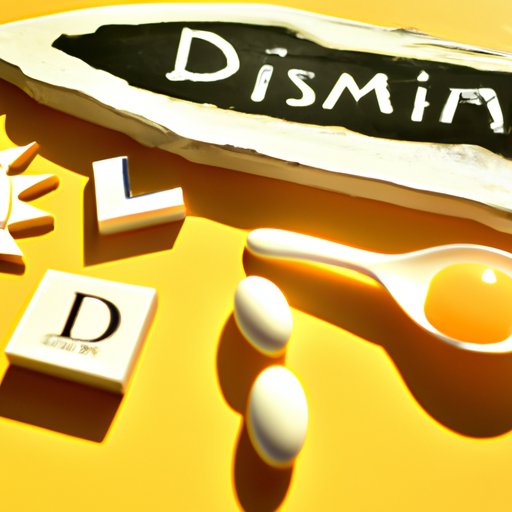Introduction
Vitamin D is an important nutrient that plays a key role in maintaining strong bones and overall health. It’s found naturally in some foods and can also be taken as a supplement. While it’s possible to get enough vitamin D through diet and sun exposure, many people don’t get enough of this essential nutrient.
Why Vitamin D is Important
Vitamin D is essential for the absorption of calcium and phosphorus, which are important for bone growth and maintenance. Vitamin D also helps regulate the immune system and has been linked to a reduced risk of certain types of cancer, heart disease, diabetes, and other chronic illnesses. Without enough vitamin D, the body won’t be able to absorb calcium properly, which can lead to weak bones and other health issues.
Overview of Benefits
Vitamin D has a range of potential benefits, including:
- Stronger bones and teeth
- Improved immunity
- Reduced risk of certain cancers, heart disease, type 2 diabetes, and other chronic illnesses
- Improved mood and cognitive function

How to Choose the Right Vitamin D Supplement for You
If you’re looking to take a vitamin D supplement, there are a few things to consider:
Types of Supplements
Vitamin D supplements come in two forms: D2 (ergocalciferol) and D3 (cholecalciferol). Both forms are effective, but research suggests that D3 may be more effective at raising and maintaining vitamin D levels in the body. Additionally, some supplements contain both D2 and D3.
Dosage
The recommended daily dose of vitamin D is 400–800 IU, depending on your age and other factors. Talk to your doctor to determine the right dosage for you.
Quality
When choosing a supplement, look for brands that are third-party tested for purity and potency. Check the label to make sure the supplement contains the form of vitamin D you’re looking for and nothing else.
How Much Vitamin D Do You Need?
Recommended Daily Intake
The recommended daily intake of vitamin D depends on your age and other factors. According to the Institute of Medicine, the following amounts are recommended:
- Infants 0–12 months: 400 IU
- Children 1–18 years: 600 IU
- Adults 19–70 years: 600 IU
- Adults 71+ years: 800 IU
Factors That Affect Vitamin D Intake
Your vitamin D needs may vary depending on several factors, including:
- Skin color: People with darker skin have a harder time absorbing vitamin D from the sun, so they may need higher doses than lighter-skinned people.
- Exposure to sunlight: People who live in areas with less sunlight may need more vitamin D than those who live in sunny climates.
- Age: As we age, our bodies become less efficient at absorbing and using vitamin D.
- Lifestyle: People who spend most of their time indoors or avoid the sun due to cultural beliefs may need more vitamin D than those who spend more time outdoors.

Dietary Sources of Vitamin D
Foods High in Vitamin D
In addition to taking a vitamin D supplement, you can get vitamin D from certain foods. Foods high in vitamin D include:
- Fatty fish, such as salmon, tuna, mackerel, and sardines
- Beef liver
- Cheese
- Egg yolks
- Mushrooms
- Fortified milk and breakfast cereals
Supplements
If you don’t get enough vitamin D from food, you can take a supplement. Look for one that is third-party tested for purity and potency. Most experts recommend taking a supplement that contains both vitamin D2 and D3.

The Importance of Sun Exposure for Vitamin D Production
Benefits of Sun Exposure
The sun is the best source of vitamin D. When the sun’s ultraviolet rays hit the skin, the body produces vitamin D. The amount of vitamin D produced depends on several factors, including the time of day, season, latitude, and skin color. Spending 15–20 minutes in the sun 2–3 times a week should be enough for most people to get the vitamin D they need.
Safety Precautions
It’s important to remember that too much sun can be dangerous. To protect yourself, always wear sunscreen with an SPF of 30 or higher and avoid spending too much time in the sun. If you do go out in the sun, be sure to wear protective clothing, such as a hat, sunglasses, and long sleeves.
Conclusion
Summary
Vitamin D is an essential nutrient that plays an important role in maintaining strong bones and overall health. It’s found naturally in some foods and can also be taken as a supplement. Most people can get enough vitamin D from diet and sun exposure, but some may need to take a supplement to meet their needs. When choosing a supplement, look for one that is third-party tested for purity and potency. Finally, remember to practice sun safety when getting vitamin D from the sun.
Reminders
To ensure you get enough vitamin D:
- Eat foods high in vitamin D, such as fatty fish, beef liver, cheese, egg yolks, mushrooms, and fortified milk and breakfast cereals.
- Take a vitamin D supplement if needed.
- Spend 15–20 minutes in the sun 2–3 times a week.
- Always wear sunscreen with an SPF of 30 or higher when going out in the sun.


